COVID-19: TCTMD’s Dispatch for December Week 1
We’re curating a list of COVID-19 research and other useful content, and updating it regularly.

Since March 2020, TCTMD reporter Todd Neale has been writing up breaking news and peer-reviewed research related to COVID-19 every weekday. In July 2021, we transitioned to Mondays, Wednesdays, and Fridays. If you have something to share, tell us. All of our COVID-19 coverage can be found on our COVID-19 Hub.
December 10, 2021
It’s looking increasingly likely that Omicron will be able to outcompete Delta to become the dominant variant, and that could be bad news for the United States, STAT reports: “All the recent attention on Omicron has distracted from the Delta trends in the US. Spikes in the Midwest and Northeast have driven average daily infections above 115,000; more than 1,200 people die each day in the U.S. Those ongoing outbreaks indicate that the conditions here are ripe for transmission, particularly with the holidays approaching. A better spreading variant could compound that and worsen the strain on short-staffed hospitals.”
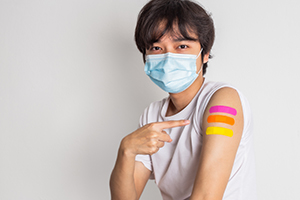 On Thursday, the US Food and Drug Administration (FDA) expanded eligibility for a booster dose of the Pfizer/BioNTech vaccine to include 16- and 17-year-olds. About a month ago, the agency authorized a booster dose at least 6 months after completion of primary vaccination for everyone 18 and older.
On Thursday, the US Food and Drug Administration (FDA) expanded eligibility for a booster dose of the Pfizer/BioNTech vaccine to include 16- and 17-year-olds. About a month ago, the agency authorized a booster dose at least 6 months after completion of primary vaccination for everyone 18 and older.
On Wednesday, the FDA issued an emergency use authorization for AstraZeneca’s monoclonal antibody therapy—tixagevimab co-packaged with cilgavimab and administered together (Evusheld)—for pre-exposure prophylaxis of COVID-19 in certain adults and younger individuals, including those who are immunocompromised and those with a history of severe adverse reactions to COVID-19 vaccines or their components.
In an interview with STAT, Anthony Fauci, MD, Director of the US National Institute of Allergy and Infectious Diseases, said it’s possible vaccines won’t need to be tailored specifically to Omicron, with sufficient protection obtained with existing shots. He cautioned, however, that there’s a need for more research, adding that it’s prudent that vaccine manufacturers are testing Omicron-specific vaccines in case they’re needed.
 Some world news from Reuters and CIDRAP News: Swiss officials are considering a limited lockdown to stem a surge in infections; Germany will require healthcare workers to prove that they have been vaccinated or have recovered from COVID-19 by mid-March; South African scientists are saying that they are not seeing signs that Omicron is causing more-severe illness; and though African COVID-19 case numbers are spiking, hospitalizations remain low.
Some world news from Reuters and CIDRAP News: Swiss officials are considering a limited lockdown to stem a surge in infections; Germany will require healthcare workers to prove that they have been vaccinated or have recovered from COVID-19 by mid-March; South African scientists are saying that they are not seeing signs that Omicron is causing more-severe illness; and though African COVID-19 case numbers are spiking, hospitalizations remain low.
Two studies in the New England Journal of Medicine provide information on the impact of Pfizer/BioNTech booster doses in Israel. The first shows that risk of mortality due to COVID-19 was a relative 90% lower in people who received a third dose at least 5 months after the second dose compared with those who didn’t receive a booster. The second shows that rates of confirmed COVID-19 and severe illness were lower among people who received a booster across all age groups.
The Moderna vaccine is more effective than the shot from Pfizer/BioNTech, suggests a study in Morbidity and Mortality Weekly Report. Between February and September of this year, effectiveness in preventing COVID-19-related hospitalizations across five VA medical centers was 86% with Moderna and 75% with Pfizer/BioNTech. For both vaccines, antibody responses faded over time, although levels were higher in recipients of the Moderna shot. “These findings from a cohort of older, hospitalized veterans with high prevalences of underlying conditions suggest the importance of booster doses to help maintain long-term protection against severe COVID-19,” the authors say.
The presence of dyspnea a year after recovering from COVID-19 may be indicative of myocardial damage, according to research presented at EuroEcho 2021, a congress of the European Society of Cardiology (ESC). “Cardiac ultrasound was performed to examine heart function and included a new imaging technique called myocardial work, which provides more precise information on heart function than previous methods,” an ESC press release states. Abnormal cardiac function was linked to persistent dyspnea in the analysis. “Myocardial work could be a new echocardiographic tool for early identification of heart function abnormalities in patients with long COVID-19, who might need more-frequent and long-term cardiac surveillance,” the researcher said.
About 2 years into the pandemic, it remains unclear where SARS-CoV-2 originated, with most scientists believing the virus jumped to humans from animals and others eyeing a lab leak, the Associated Press reports. “Now, with the global COVID-19 death toll surpassing 5.2 million on the second anniversary of the earliest human cases, a growing chorus of scientists is trying to keep the focus on what they regard as the more plausible ‘zoonotic,’ or animal-to-human, theory, in the hope that what’s learned will help humankind fend off new viruses and variants.”
Efforts are still needed to develop new therapeutics to prevent and treat COVID-19 even as effective vaccines continue to roll out around the world, according to a statement from the International Coalition of Medicines Regulatory Authorities (ICMRA) endorsed by the European Medicines Agency (EMA). “This is especially important in order to have treatment options for people who are unable to be vaccinated or who have lower immune response to vaccines (eg, people who are immunocompromised), and to address issues such as breakthrough infections, the emergence of SARS-CoV-2 variants with some level of vaccine resistance, and waning immunity,” the statement reads.
 Patients younger than 21 with probable or confirmed myocarditis after COVID-19 vaccination generally fare well, with rapid resolution of symptoms and a short hospital stay, a multicenter US and Canadian study published in Circulation shows. Most patients who underwent cardiac magnetic resonance imaging had abnormalities suggestive of myocarditis, although LV function was impaired in only 18.7%. Among that latter group, function normalized on follow-up for all but one patient (who had not yet completed follow-up at the time of the study publication). TCTMD has the story.
Patients younger than 21 with probable or confirmed myocarditis after COVID-19 vaccination generally fare well, with rapid resolution of symptoms and a short hospital stay, a multicenter US and Canadian study published in Circulation shows. Most patients who underwent cardiac magnetic resonance imaging had abnormalities suggestive of myocarditis, although LV function was impaired in only 18.7%. Among that latter group, function normalized on follow-up for all but one patient (who had not yet completed follow-up at the time of the study publication). TCTMD has the story.
December 8, 2021
 The Omicron variant is now present in at least 57 countries, with hospitalizations set to rise, the World Health Organization (WHO) said Wednesday (Reuters), noting that it’s still unclear what impact the strain will have on disease severity and vaccine effectiveness. “Even if the severity is equal or potentially even lower than for Delta variant, it is expected that hospitalizations will increase if more people become infected and that there will be a time lag between an increase in the incidence of cases and an increase in the incidence of deaths,” the WHO said. Countries need to act now to stem Omicron’s spread, WHO Director-General Tedros Adhanom Ghebreyesus, MD, urged.
The Omicron variant is now present in at least 57 countries, with hospitalizations set to rise, the World Health Organization (WHO) said Wednesday (Reuters), noting that it’s still unclear what impact the strain will have on disease severity and vaccine effectiveness. “Even if the severity is equal or potentially even lower than for Delta variant, it is expected that hospitalizations will increase if more people become infected and that there will be a time lag between an increase in the incidence of cases and an increase in the incidence of deaths,” the WHO said. Countries need to act now to stem Omicron’s spread, WHO Director-General Tedros Adhanom Ghebreyesus, MD, urged.
South Africa reported nearly 20,000 new COVID-19 cases on Wednesday, a record since Omicron was first detected, although it’s unclear how many of the cases are attributable to the newly discovered variant (Reuters).
COVID-19 cases and hospitalizations are surging in the United States even as the country approaches 200 million people fully vaccinated, the Associated Press reports. The average number of new daily cases is now around 119,000, up from about 95,000 a few weeks ago, and hospitalizations have increased by about 25% compared with a month ago. “The increases are due almost entirely to the Delta variant, though the Omicron mutation has been detected in about 20 states and is sure to spread even more.” CIDRAP News has more on the US Omicron situation.
On Tuesday, Medicago and GlaxoSmithKline announced positive results from a phase III trial of their adjuvanted, plant-based COVID-19 vaccine. In a study conducted while variants were circulating, the overall vaccine efficacy rate was 71%, including 75.3% efficacy against the Delta variant and 88.6% efficacy against the Gamma variant. Omicron was not circulating during the study. “If approved, we will be contributing to the world’s fight against the COVID-19 pandemic with the world’s first plant-based vaccine for use in humans,” Medicago’s CEO and president said in a statement. NPR provides some context.
In its living guideline on COVID-19 drugs, published in the BMJ, the WHO has strongly recommended against use of convalescent plasma in patients with nonsevere disease, and has advised against using the treatment in patients with more-severe disease except in the context of a clinical trial.
Regarding vaccine effectiveness, some hopeful (but not definitive) news: Lab studies suggest that three doses of the COVID-19 vaccine from Pfizer and BioNTech effectively neutralize the Omicron variant, whereas two doses are insufficient, the companies announced Wednesday. “Data indicate that a third dose . . . increases the neutralizing antibody titers by 25-fold compared to two doses against the Omicron variant; titers after the booster dose are comparable to titers observed after two doses against the wild-type virus which are associated with high levels of protection.” Nonetheless, the companies are continuing to develop an Omicron-specific vaccine and expect to have it available by March 2022 if needed. Separately, a South African research team reported results of a study showing that Omicron can partially evade protection from two doses of the vaccine (Reuters).
The European Medicines Agency (EMA) and the European Centre for Disease Prevention and Control (ECDC) have issued recommendations on use of heterologous—or mix-and-match—vaccination, stating that people can mix shots from different manufacturers for either initial courses or booster doses. The EMA also recently recommended approval of tocilizumab for the treatment of adults with COVID-19 who are receiving systemic treatment with corticosteroids and require supplemental oxygen or mechanical ventilation.
 The US Food and Drug Administration is maintaining a site detailing the impact of various SARS-CoV-2 viral mutations on available COVID-19 tests. Of note, the Tide Laboratories DTPM COVID-19 RT-PCR Test is expected to miss the Omicron variant, but not other variants.
The US Food and Drug Administration is maintaining a site detailing the impact of various SARS-CoV-2 viral mutations on available COVID-19 tests. Of note, the Tide Laboratories DTPM COVID-19 RT-PCR Test is expected to miss the Omicron variant, but not other variants.
Scientists have detected a “stealth” version of Omicron that cannot be distinguished from other SARS-CoV-2 variants using PCR tests, The Guardian reports. “The variant is still detected as coronavirus by all the usual tests, and can be identified as the Omicron variant through genomic testing, but probable cases are not flagged up by routine PCR tests that give quicker results.”
Patients who have recovered from a prior SARS-CoV-2 infection have a strong immune response to the first dose of the vaccine from Pfizer/BioNTech that isn’t enhanced much after a second dose, whereas people with no prior infection have progressively stronger responses after each dose, according to a study in Science Translational Medicine. The findings “may have implications for personalizing mRNA vaccination regimens used to prevent COVID-19, including for the deployment of booster shots,” the authors say.
December 6, 2021
Omicron is ratcheting up around the globe, with at least 35 countries now reporting cases of the B.1.1.529 variant. South Africa’s outbreak “continues to grow steeply,” CIDRAP reports, summarizing a Reuters story. Meanwhile, community spread appears to be responsible for at least some of the transmissions, the European Centre for Disease Prevention and Control stated over the weekend.
Heading into the weekend at least 17 US states reported Omicron cases, including some among people with no history of recent overseas travel, prompting presidential advisor and National Institute of Allergy and Infectious Diseases director Anthony Fauci, MD, to say “we absolutely have community spread,” on Bloomberg Television.
 A research letter in the US Centers for Disease Control and Prevention (CDC)’s Emerging Infectious Diseases bulletin describes a case of Omicron transmission that occurred in a fully vaccinated traveler isolated across the corridor from a full vaccinated, asymptomatic Omicron-positive traveler in a quarantine hotel in Hong Kong. “Airborne transmission across the corridor is the most probable mode of transmission,” researchers say.
A research letter in the US Centers for Disease Control and Prevention (CDC)’s Emerging Infectious Diseases bulletin describes a case of Omicron transmission that occurred in a fully vaccinated traveler isolated across the corridor from a full vaccinated, asymptomatic Omicron-positive traveler in a quarantine hotel in Hong Kong. “Airborne transmission across the corridor is the most probable mode of transmission,” researchers say.
JAMA convened an expert panel to discuss the knowns and unknowns with Omicron, publishing an edited transcript of the conversation in the journal today.
The CDC announced Friday that it is shortening the time line for required pretravel testing by international air travelers to the United States: effective today, tests must be taken 1 day before departure instead of in the 3-day window previously required. “As we learn more about the Omicron variant, this new 1-day testing policy will help to protect travelers and the health and safety of American communities from COVID-19,” a statement explains.
A wider gap between doses of the mRNA vaccines appears to boost immunity, a new study suggests. Writing in JAMA Network Open, investigators say that paramedics, mean age 41, whose second dose was delayed (102-118 days between first and second doses) demonstrated better immunogenicity against COVID-19, including the Delta variant, as compared with those who had their second dose 21 to 36 days after their first. “A delayed second-dose strategy could yield faster partial protection to a larger proportion of the population when vaccine supplies are limited,” the Canadian researchers say. Of note, this was the approach taken in Canada when the vaccine was first being rolled out. “The trade-off of lower individual immune protection after one dose may be unfavorable in at-risk groups or settings where COVID-19 prevalence is high,” the authors acknowledge.
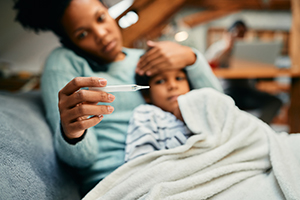 An analysis of the CHASING COVID study, published in JAMA Pediatrics today, reveals stark differences among parents as to whether they will vaccinate their children. “Parental hesitancy to vaccinate children against COVID-19 differs by parental race and ethnicity, gender, education level, and previous experience with COVID-19 and the child's age,” investigators say. “Perhaps unsurprisingly, parents who were hesitant to be vaccinated themselves were hesitant to vaccinate their children.” However, some vaccinated parents also expressed hesitancy about vaccinating their kids. Having children at school, having had a personal COVID-19 infection, and knowing someone who died of the disease were associated with an increased willingness to have children vaccinated.
An analysis of the CHASING COVID study, published in JAMA Pediatrics today, reveals stark differences among parents as to whether they will vaccinate their children. “Parental hesitancy to vaccinate children against COVID-19 differs by parental race and ethnicity, gender, education level, and previous experience with COVID-19 and the child's age,” investigators say. “Perhaps unsurprisingly, parents who were hesitant to be vaccinated themselves were hesitant to vaccinate their children.” However, some vaccinated parents also expressed hesitancy about vaccinating their kids. Having children at school, having had a personal COVID-19 infection, and knowing someone who died of the disease were associated with an increased willingness to have children vaccinated.
The American Heart Association issued a statement in support of the US CDC’s recommendation that all adults 18 and older get a booster shot, “especially in light of the Omicron variant.”
In New York City, all private employers must require employees to be vaccinated against COVID-19 as of December 27. “We in New York City have decided to use a preemptive strike to really do something bold to stop the further growth of COVID and the dangers it’s causing to all of us,” Mayor Bill De Blasio said on MSNBC’s Morning Joe.
But while most of the world has embraced the science supporting vaccination, some holdouts seem increasingly desperate to avoid getting the jab. A dentist in Italy tried to get his mandatory shot by presenting a nurse with a fake, silicon arm, the Associated Press reports. “I understood immediately that the man was trying to avoid the vaccination by using a silicone prosthetic, into which he hoped that I would inject the drug, unaware,” the nurse told Italian newspaper Corriere della Sera.
Misinformation on vaccinations and the polarization this has created along political lines are not only spreading fear—they’re also upping mortality, an NPR investigation suggests. In an analysis of deaths per 100,000 people in 3,000 counties across the United States, deaths from COVID-19 are three times higher in counties that voted predominantly for Donald Trump in the last election than in those that voted mostly for Joe Biden. “The higher the vote share for Trump, the lower the vaccination rate,” the analysis notes.
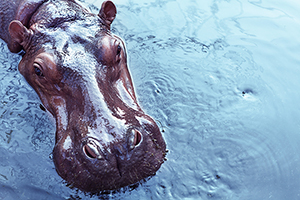 Belgium is reporting the first coronavirus case in a hippopotamus—two, in fact, the Washington Post reports. “It remains unclear how hippopotamuses Imani, 14, and Hermien, 41, contracted the virus, but the pair appear to be doing well and have no symptoms other than their runny, sticky noses.” The World Organization for Animal Health announced it is formally tracking “the high prevalence of SARS-CoV-2 infection within white-tailed deer populations in North America. . . . As they do not show clinical signs of infection, white-tailed deer should be monitored for the possibility of becoming a silent reservoir.”
Belgium is reporting the first coronavirus case in a hippopotamus—two, in fact, the Washington Post reports. “It remains unclear how hippopotamuses Imani, 14, and Hermien, 41, contracted the virus, but the pair appear to be doing well and have no symptoms other than their runny, sticky noses.” The World Organization for Animal Health announced it is formally tracking “the high prevalence of SARS-CoV-2 infection within white-tailed deer populations in North America. . . . As they do not show clinical signs of infection, white-tailed deer should be monitored for the possibility of becoming a silent reservoir.”
TCTMD Managing Editor Shelley Wood contributed today’s Dispatch.
Todd Neale is the Associate News Editor for TCTMD and a Senior Medical Journalist. He got his start in journalism at …
Read Full Bio


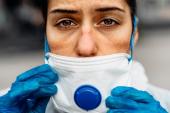

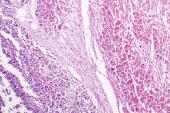
Comments